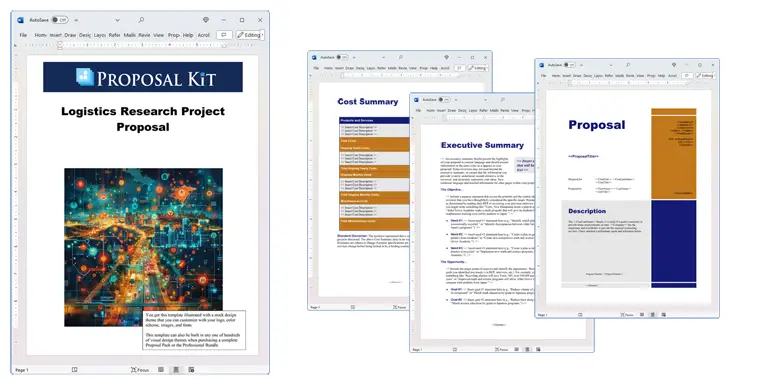How to write your Logistics Research Project Proposal
We include this 17 page layout with every Proposal Pack. If you want this template to have a different visual design theme than the one illustrated here, purchase any Proposal Pack design and create this template using the purchased design theme. This template is included in every Proposal Pack. If you get a Proposal Pack or the Professional, you can also make any variation of this template with different chapters to suit your needs.
We typically include more chapters in the templates than most people will need to give everyone more variety in the chapters they may need. You can trim down a long template by removing pages you do not need or combining multiple chapter topics into one page.
 DOWNLOADABLE, ONE-TIME COST, NO SUBSCRIPTION FEES
DOWNLOADABLE, ONE-TIME COST, NO SUBSCRIPTION FEESYou can also create countless variations of this document to suit your needs using the included library of 2200+ chapters if ordering a Proposal Pack or Professional.
 What Our Clients Say
What Our Clients SayThe Proposal Pack is an outstanding product, It speeds the proposal process by almost 75%. That adds up to more deals per year. A great growth enabling tool."
Arvato
Related Article
Related Video
Related Templates
- Transportation Logistics Project Proposal
- Supply Chain Logistics Project Proposal
- Manufacturing and Distribution Proposal
- Transportation Shipping Services Proposal
- Medical Equipment Supply and Transportation Proposal
- Supply Chain Disruption and Risk Report
- Relocate Manufacturing Domestic Proposal
- Research Funding Request Proposal
- International Research and Development Project Proposal
- Research Proposal (Long)
- Logistics and Shipping Services Proposal Template
- Research Proposal (Short)
- Sports Team Relocation and Sponsorship Proposal
- Logistics Services Proposal Template
- PhD Thesis Proposal
What's the Best Way to Write Your Logistics Research Project Proposal?
If you need to create a logistics research project proposal, the Proposal Kit template and software package are a proven solution. This system streamlines the proposal creation process and integrates a comprehensive line item quoting database for detailed cost summaries, quotes, estimates, budgets, and other financial calculations critical to your proposal.
Are you currently facing the challenge of writing such a proposal, or are you in a similar situation? Proposal Kit can help simplify this complex task.
What Types of Projects Are Logistics Research Project Proposals Written For?
Logistics research project proposals are used across various sectors to address specific logistical challenges or explore new strategies. Here are some potential projects that proposals are written for:
- Supply Chain Optimization Study
- Warehouse Location Analysis
- Transportation Cost Reduction Plan
- Inventory Management System Upgrade
- Last-Mile Delivery Improvement Project
- Reverse Logistics Enhancement Strategy
- Cross-Docking Efficiency Project
- Freight Consolidation Study
- Route Planning Software Implementation
- Supplier Relationship Management Improvement
- Import/Export Procedure Optimization
- Sustainable Logistics Practices Introduction
- Customer Service in Supply Chain Analysis
- Disaster Recovery Planning for Logistics
- Automated Warehousing Solutions Study
- Fleet Management Enhancements
- Packaging Optimization Research
- Third-Party Logistics (3PL) Partner Evaluation
- Supply Chain Visibility Project
- Compliance Tracking Systems Upgrade
Chapters this template is built with
Creating a custom-tailored logistics research project proposal is necessary because no single pre-made template fits all scenarios. Proposal Kit's software facilitates the creation of tailored proposals by offering an extensive library of chapter templates you can customize for any situation.
Cover Letter
Introduce your proposal and establish a professional first impression, setting the stage for the following detailed documents. In a logistics research project proposal, the cover letter should briefly outline your credentials, express your enthusiasm for the project, and provide contact information for the primary point of responsibility.
Introduction
Outline the purpose of the logistics research project, highlighting the key objectives and the value it proposes to the organization. This section should give an overview of the logistics project, such as improving supply chain efficiency or reducing transportation costs, and explain why it is essential.
Problem Statement
Clearly define the logistical issue your project aims to solve, providing context and urgency. For example, address frequent supply chain delivery delays or high warehousing costs. Detailing the problem establishes the need for the research.
Abstract
Summarize the entire proposal concisely and compellingly, giving stakeholders a snapshot of the project. This section should encapsulate the logistics research project's primary goals, objectives, and methods and explain how these will address the identified problem.
Cost Summary
Use the integrated quoting tool to detail all expenses involved, ensuring transparency and aiding in budget approvals. This section should break down costs into labor, materials, equipment, and other resources, giving stakeholders a clear understanding of the financial requirements.
SWOT Analysis
Examine the Strengths, Weaknesses, Opportunities, and Threats associated with the logistics strategy under consideration. For instance, if you're proposing a new warehousing system, this section would analyze the benefits (strengths), potential risks (weaknesses), market opportunities, and external threats to implementation.
Expected Results
Articulate the anticipated outcomes of the logistics project, providing a clear picture of projected benefits. This might include expected improvements in delivery times, cost reductions, or enhanced customer satisfaction. Clearly defined expected results help justify the project's value.
Implementation
Detail the step-by-step plan for executing the logistics project, including timelines and milestones. This section should provide a clear roadmap, outlining critical tasks, responsible parties, and a schedule that ensures the project's timely completion.
Resource Management
Discuss the resources (human, technical, and material) required to carry out the project successfully. This includes identifying team members, technology needs, and physical resources such as vehicles or warehouse space. Effective resource management ensures the project can proceed without unnecessary delays or costs.
Methodology
Outline the methods for conducting the research or analysis, ensuring stakeholders understand the approach. Explain techniques such as data collection, statistical analysis, and modeling that will be used to examine the logistics issue and support the project's goals.
Literature Review
Present a review of existing research relevant to your logistics issue, establishing a foundation for the project. This section should summarize critical studies, articles, and papers that provide background and context, highlighting gaps your research aims to fill.
Processes
Describe the processes that will be evaluated or modified within the logistics project. For example, if the project involves optimizing inventory management, this section should detail current inventory processes and proposed changes to improve efficiency.
Recommendations
Offer advice based on the research findings, guiding future actions for logistical improvements. This section should provide actionable suggestions for stakeholders, such as adopting new technologies, restructuring logistics networks, or investing in training programs.
Logistics
Delve into the details of the logistical aspects of the project, explaining how logistical operations will be handled during the project. This might include planning for transportation, warehousing, materials handling, and other logistical requirements, ensuring seamless project execution.
Use cases for this template
Streamlining Supply Chain for Effortless Meetings Inc.
The Challenge
Effortless Meetings Inc., a company specializing in organizing corporate events, faced increasing costs and delays in its supply chain. This inefficiency threatened their reputation and profitability.
The Solution
Alice, the small business owner, decided that a comprehensive Supply Chain Optimization Study was necessary. She turned to the Proposal Kit for assistance. Using Proposal Kit's extensive library of templates, Alice created a meticulous proposal that outlined her plan to streamline the supply chain. Each proposal section, from the Cover Letter to the Methodology, was designed to address specific pain points in their logistics operations.
The Implementation
Alice used the SWOT Analysis template to demonstrate the strengths and weaknesses of the current supply chain system. She highlighted opportunities for improvement and potential threats if changes were not implemented. The Cost Summary template gave her a clear, itemized breakdown of the projected savings and expenses.
The Outcome
The proposal was comprehensive and professional, impressing stakeholders and gaining approval. With the green light, Alice successfully initiated the optimization project, resulting in a more efficient supply chain that reduced costs and improved delivery times, enhancing the company's overall performance.
Fast-Track Proposal Success for Quick Solutions Ltd.
The Challenge
Quick Solutions Ltd., a consulting firm, was invited to submit a Transportation Cost Reduction Plan proposal on a concise notice. The company had just a few days to develop a detailed and persuasive document.
The Solution
Bob, an employee at Quick Solutions Ltd., took on the daunting task. Knowing time was of the essence, he chose Proposal Kit to expedite the process. Additionally, he used an AI writing tool to generate specific chapters, using the AI to analyze the company's website for relevant content and insights.
The Implementation
Bob started with the Introduction and Problem Statement templates, clearly defining the transportation cost issues the client was facing. The AI tool helped him quickly write these sections by extracting pertinent information from the company's data. Bob then used the Methodology and Expected Results templates to outline a step-by-step plan for achieving cost reductions and the anticipated benefits.
The Outcome
Despite the tight deadline, Bob submitted the proposal on time. The well-structured and data-driven proposal caught the client's attention, leading to Quick Solutions Ltd. winning the project. The success showcased the effectiveness of combining Proposal Kit's templates with AI tools for rapid and precise proposal development.
Non-Profit Navigates New Territory with Hope and Growth
The Challenge
Hope and Growth, a non-profit organization, needed to prepare a Request for Proposal (RFP) for a Disaster Recovery Planning project. The goal was to find a qualified service provider to help them prepare for potential disasters and ensure the continuity of their operations.
The Solution
Cara, the director at Hope and Growth, was responsible for writing the RFP. She turned to the Proposal Kit for guidance. With the software, Cara could structure the RFP document with clear and detailed sections, ensuring that all necessary information was included.
The Implementation
Cara used the Cover Letter template to introduce the non-profit's mission and the importance of the Disaster Recovery Planning project. She detailed the Problem Statement to explain why the project was important and used the Recommendations template to specify the criteria for selecting a service provider. The Literature Review template helped her include relevant research and data supporting the need for the project.
The Outcome
The professionally created RFP attracted high-quality responses from potential service providers. The document's clarity and thoroughness made it easy for respondents to understand the non-profit's requirements and submit well-aligned proposals. As a result, Hope and Growth successfully selected a provider who met their needs and helped them implement an effective disaster recovery plan.
Conclusions and Recommendations
Using Proposal Kit templates and software simplifies writing a logistics research project proposal. From creating a cover letter to detailing a sophisticated cost analysis, Proposal Kit provides all the tools to create a customized proposal that meets specific project needs, ultimately helping win bids and secure contracts.
Also Known As
This template may also be referred to in different ways or be used in more specialized situations, such as:
- Logistics Management Proposal
- Supply Chain Research Proposal
- Transportation Analysis Proposal
- Warehouse Optimization Proposal
- Freight System Study Proposal
- Inventory Control Proposal
- Delivery Efficiency Research
- Logistics Plan Proposal
- Reverse Logistics Strategy Plan
- Supply Chain Improvement Proposal
Abstract
 Logistics research papers are important for businesses aiming to optimize their supply chain operations and remain competitive in the industry. Creating a logistics research project proposal requires a comprehensive understanding of business logistics and supply chain management concepts. The research process involves examining various topics such as freight transportation, procurement, and performance measurement while considering the carbon footprint and green logistics initiatives.
Logistics research papers are important for businesses aiming to optimize their supply chain operations and remain competitive in the industry. Creating a logistics research project proposal requires a comprehensive understanding of business logistics and supply chain management concepts. The research process involves examining various topics such as freight transportation, procurement, and performance measurement while considering the carbon footprint and green logistics initiatives.
These proposals often deal with complex issues like inventory management, last-mile delivery, and disaster recovery planning. A well-structured proposal includes a clear thesis statement and evidence, offering perspectives on improving security and complying with regulations.
Universities and government agencies are often interested in collaborating on such projects to gain insights and explore innovative solutions. Successful proposals require a focus on practical ideas and the ability to link research findings to real-world applications. The Proposal Kit system can be helpful in this process, providing automated tools for complex document assembly and an extensive library of templates that ease the creation of a customized format. By incorporating these tools, organizations can efficiently complete their proposals, ensuring they stand out and influence key stakeholders to secure project approvals.
 Logistics research paper writing is an important skill for professionals and academics aiming to address the dynamic challenges in supply chain management. These documents serve as a cornerstone in the exploration of innovative solutions and sustainable practices that enhance business logistics. Universities often incorporate logistics research papers into their curriculum, offering courses that emphasize collaboration with industry partners to provide students with real-world insights. This collaboration enriches the learning experience, making the research process not only educational but also interesting and relevant to current industry demands.
Logistics research paper writing is an important skill for professionals and academics aiming to address the dynamic challenges in supply chain management. These documents serve as a cornerstone in the exploration of innovative solutions and sustainable practices that enhance business logistics. Universities often incorporate logistics research papers into their curriculum, offering courses that emphasize collaboration with industry partners to provide students with real-world insights. This collaboration enriches the learning experience, making the research process not only educational but also interesting and relevant to current industry demands.
For businesses and organizations, completing a well-written logistics research paper can lead to significant improvements in operational efficiency and cost reductions. The Proposal Kit facilitates this process by offering a user-friendly platform with customizable templates and automated quoting tools. This system streamlines the document creation process, allowing users to focus on developing compelling content that addresses specific logistical challenges. As a result, organizations can produce high-quality proposals that communicate their objectives and solutions, ultimately securing buy-in from stakeholders and supporting successful project implementation.
Logistics research paper writing plays a role in not only advancing supply chain knowledge but also in shaping future professionals through academic endeavors. Universities are at the forefront of this educational journey, offering specialized courses that equip students with the analytical skills needed to tackle complex logistical issues. Through rigorous academic training and exposure to real-world situations, students learn to create logistics research papers that are both theoretically sound and practically applicable.
 These academic exercises often involve collaboration with industry leaders, providing a bridge between theoretical knowledge and practical application. By engaging in such collaborative efforts, students gain a deeper understanding of the intricacies involved in supply chain management and the importance of logistics in a global market. This experience is invaluable, as it prepares them for careers where they can contribute to business logistics and operations.
These academic exercises often involve collaboration with industry leaders, providing a bridge between theoretical knowledge and practical application. By engaging in such collaborative efforts, students gain a deeper understanding of the intricacies involved in supply chain management and the importance of logistics in a global market. This experience is invaluable, as it prepares them for careers where they can contribute to business logistics and operations.
For professionals already in the field, engaging in logistics research paper writing allows them to stay at the cutting edge of industry trends and continuously improve their organizational strategies. The insights gained from this research not only advance individual careers but also drive innovation and efficiency within their organizations. Thus, logistics research papers serve as a vital tool in fostering a culture of continuous improvement and academic excellence in both educational and professional settings.
Frequently Asked Questions
What should I include in a logistics research project proposal?
When writing a logistics research project proposal, it's crucial to cover several key elements to ensure your proposal is comprehensive and compelling. These essential elements include a Cover Letter to introduce your project, an Introduction detailing the purpose and objectives, and a Problem Statement clearly defining the logistical issues you aim to solve. Additionally, you should include sections like Cost Summary, SWOT Analysis, Methodology, and Expected Results to provide a well-rounded view of your project. Each component helps stakeholders understand your logistics research's scope and potential impact.
How can I make my logistics research project proposal stand out?
Present a clear, concise, and well-structured document to make your logistics research project proposal stand out. Highlight the unique aspects of your approach to solving the logistics issues and back up your claims with data and research. Use visuals such as charts and graphs to illustrate key points and make your proposal more engaging. Additionally, Proposal Kit templates can give your proposal a professional appearance and ensure you comprehensively cover all necessary elements. A standout proposal addresses the logistical challenges and clearly outlines the benefits and value it will bring the organization.
What common mistakes should I avoid when writing a logistics research project proposal?
One common mistake in writing a logistics research project proposal is failing to define the problem clearly. A vague problem statement can make sure stakeholders understand what you aim to address. Another mistake is neglecting the financial details; a thorough Cost Summary is essential for gaining approval. Overloading the proposal with jargon or overly technical terms can also be a pitfall, making the document easier to read for non-specialists. Using Proposal Kit can help you avoid these mistakes by providing structured templates and guidance on important content, ensuring your proposal is clear, concise, and comprehensive.
How detailed should the Cost Summary be in a logistics research project proposal?
The cost summary in a logistics research project proposal should be detailed enough to explain all expenses involved clearly. This includes direct costs like materials and labor and indirect costs such as overheads and contingency funds. Break down the costs into specific categories and provide justifications for each expense. Using Proposal Kit's integrated quoting tool can help you create a transparent and detailed Cost Summary, making it easier for stakeholders to see the financial feasibility of your project. A well-detailed Cost Summary can significantly enhance the credibility of your proposal.
How can Proposal Kit help me meet tight deadlines for my logistics research project proposal?
Proposal Kit can be a lifesaver when working under tight deadlines for your logistics research project proposal. The software's extensive library of customizable templates allows you to quickly assemble a professional proposal without starting from scratch. Additionally, the integrated quoting tools streamline the process of creating detailed financial projections, and the structured templates ensure you get all critical components. Combining Proposal Kit with AI writing tools can expedite the content creation process, making it possible to meet even the most stringent deadlines efficiently.
20% Off Discount
![]() Add To Cart This Word Template
Add To Cart This Word Template
 Add To Cart Proposal Pack for Any Business
Add To Cart Proposal Pack for Any Business
 Add To Cart Proposal Kit Professional
Add To Cart Proposal Kit Professional
 4.7 stars, based on 849 reviews
4.7 stars, based on 849 reviewsProposal Kit chapters used in this template
Cover Letter, Title Page, Table of Contents, Abstract, Introduction, Logistics, Literature Review, Problem Statement, Methodology, Resource Management, Implementation, Processes, SWOT Analysis, Recommendations, Cost Summary, Expected Results, Back Page
Line Item Automated Chapters
If you purchase a Proposal Pack or the Professional Bundle, these proposal pages are generated using an automated line-item database in the included Wizard software.
Cost Summary
You use this proposal for
- General business proposal
- Non-technical proposal
- Project pitch proposal
- Internal company proposal
- Business document, study, plan, report
- Transportation, logistics proposal
How to create this template with Proposal Pack Wizard
You can create this document using any of the logo-designed Proposal Packs. Pick any Proposal Pack with a logo design theme you like best; they will all work equally well. The Proposal Pack for Any Business is the pack with no extra added logos or colors - designed to be used plain or for you to customize with your logos and graphics.
The Proposal Pack design theme you purchase will determine the visual look of this template. The screenshot above only shows the plain generic design theme.
We include a library of chapters to be assembled based on your needs. All proposals are different and have different needs and goals. We designed Proposal Pack so you can customize the documents to suit your needs.
You will best create this document using the Proposal Pack Wizard - Expert Edition software to select this template and build it in the Proposal Pack logo design theme of your choice along with any desired customizations (such as adding additional chapters, removing unneeded chapters, changing the order of chapters, and importing your company logo). This template outlines a proposal for the described situation. Each user is responsible for typing in the actual content of the provided pages with their information to complete the proposal. Suggestions in the abstract may include features in higher-end packages and are facilitated by the selection of chapter templates to support the narrative of each proposal, which help guide the user in filling in the details.
The Wizard software's AI Writer will write the content of the pages of the template based on details provided for your company, client, project, financial details and other writing instructions. This will provide a personalized version of the template completely written and ready to edit.
Once finished, the AI Writer's Word-to-PowerPoint converter can transform your proposal, business plan, or other business documents into a PowerPoint slideshow. Save time and effort by letting the AI analyze every chapter to condense its content into talking points, visually matching the document, and providing a consistent package of presentation material with the click of a button.
You create this template using the Wizard software with an entire Proposal Pack library and software. We include the Expert Edition of the software in the Proposal Kit Professional. Microsoft Word for Windows is required to use the customizing software. You can also edit Word document templates in other office software such as Word for Mac. We will assist Mac users in assembling complex templates for their first project if they do not have the required platform to run the Wizard software.
How to Build Templates Featured on Proposal Kit Website
Many people find the Proposal Kit website after searching for a specific proposal. Once you've purchased and installed the software, how do you build that template you found in the first place? This video shows you how to build any proposal you see on the Proposal Kit website.
 Ian Lauder has been helping businesses write their proposals and contracts for two decades. Ian is the owner and founder of Proposal Kit, one of the original sources of business proposal and contract software products started in 1997.
Ian Lauder has been helping businesses write their proposals and contracts for two decades. Ian is the owner and founder of Proposal Kit, one of the original sources of business proposal and contract software products started in 1997.By Ian Lauder
 Published by Proposal Kit, Inc.
Published by Proposal Kit, Inc.


 Cart
Cart
 Get 20% off ordering today:
Get 20% off ordering today: 


 Facebook
Facebook YouTube
YouTube Bluesky
Bluesky Search Site
Search Site